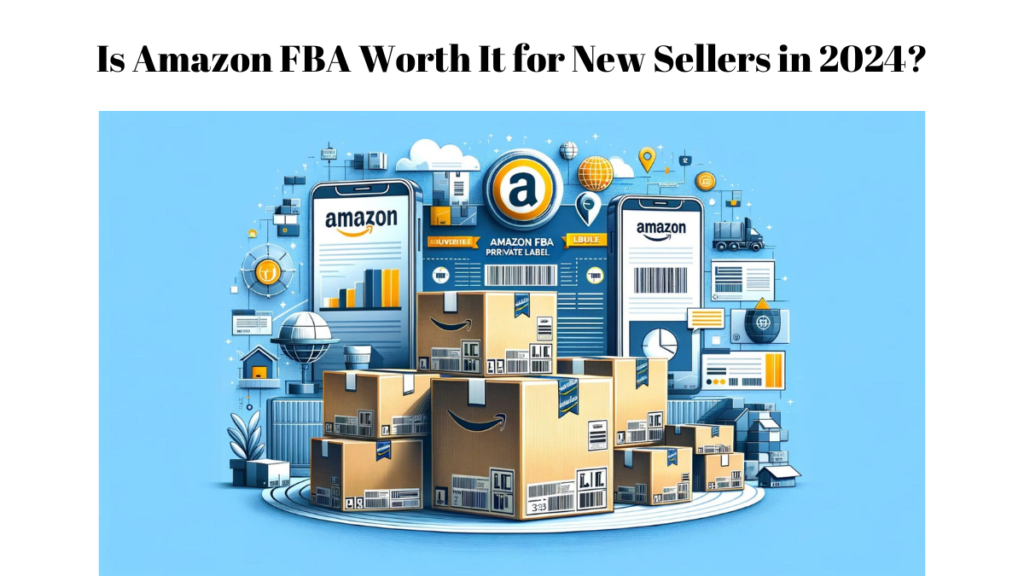You are considering launching an online business this year and Amazon FBA has caught your eye. It is no surprise, given Amazon’s long-standing reign in the e-commerce world. However, with such a competitive market, you might wonder if it’s still viable.
DO not worry. In this article, we will walk you through the question; is amazon FBA worth it for new sellers and ups and downs of selling on Amazon FBA to help you find out if it is the right fit for you.
- What is Amazon FBA All About?
- Why Choose Amazon FBA?
- What is the best thing with Amazon FBA?
- Amazon’s policies and standards
- Keeping Score of your Performance Metrics:
- Product Requirements:
- Restricted Products:
- Facing Competition
- Find a profitable niche
- Some FAQs
- What is Amazon FBA?
- What are the benefits of Amazon FBA?
- What are the challenges of Amazon FBA?
- Is Amazon FBA worth it in 2024?
What is Amazon FBA All About?
FBA, or Fulfillment by Amazon, is a service where Amazon takes care of the storage, packaging, shipping, and customer service for your products. Your job? Send your inventory to an Amazon warehouse and they will handle the rest.
Also, you get to be part of Amazon’s Prime program, offering speedy, free delivery to millions of customers.
Why Choose Amazon FBA?
There are a number of benefits when it comes to selling on Amazon FBA:
Reach a big base of customers: With over 300 million active customers globally and more than 150 million Prime members, selling on Amazon FBA gives you access to a huge audience that already trusts and enjoys shopping on Amazon.
Save resources: By letting Amazon handle fulfillment, you can concentrate on other parts of your business, such as marketing, product research, and branding. There is no need to stress about warehouse rent, staffing, or inventory management.
Scale with ease: With Amazon FBA, stock shortages or order fulfilment during busy periods will not be a concern. Amazon’s network of over 175 fulfilment centres worldwide can handle any sales volume. Also, you can grow your business internationally with Amazon’s global selling program.
Make the most of Amazon’s tools and services: As an Amazon FBA seller, you get access to a range of tools and services to help your business thrive, including:
- Seller Central: Your one-stop dashboard for managing inventory, orders, payments, reports, and more.
- FBA Revenue Calculator: This is a handy tool for estimating your profit margin and fees for each product you sell on Amazon FBA.
- FBA Small and Light: A program offering lower fulfillment fees for small, lightweight products priced under $7.
- Brand Registry: A service protecting your brand from counterfeiters and unauthorized sellers. It also gives you access to features like Enhanced Brand Content, Sponsored Brands, and Stores.
- Advertising: A service letting you promote your products on Amazon and other platforms using various ad formats, such as Sponsored Products, Sponsored Display, and Video Ads.
What is the best thing with Amazon FBA?
Like anything, selling on Amazon FBA comes with its own set of challenges:
Fees are part of the deal. As an Amazon FBA seller, you will need to pay various fees for the service, including:
- Referral fee: A percentage of the sale price that Amazon charges for each product you sell on their platform. The referral fee varies by product category, but it’s typically between 8% to 15%.
- Fulfillment fee: A fee covering the cost of picking, packing, shipping, and handling your products. The fulfillment fee depends on your product’s size and weight, but it’s usually between $2.50 to $5.00 per unit.
- Storage fee: A fee for storing your inventory in Amazon’s warehouses. The storage fee varies by product size and season, but it is usually between $0.48 to $2.40 per cubic foot per month.
- Rules and regulations apply: As an Amazon FBA seller, you’ll need to adhere to Amazon’s policies and standards.
Amazon’s policies and standards
You have to follow the rules and regulations. As an Amazon FBA seller, you have to comply with Amazon’s policies and standards, such as:
Keeping Score of your Performance Metrics:
As a seller, you are graded on metrics like order defect rate, cancellation rate, and late shipment rate. Keep your scores high to avoid account suspension or termination.
Product Requirements:
Your products need to meet certain requirements to qualify for FBA. This includes packaging, labelling, safety, and quality standards. Stick to these rules to prevent your products from being rejected or removed from FBA.
Restricted Products:
There are certain products that are banned or restricted from being sold on Amazon or FBA due to legal or ethical reasons. This includes items like alcohol, drugs, weapons, animals, hazardous materials, and more.
Facing Competition
As an Amazon FBA seller, you are up against millions of other sellers on the platform. Here is how you can differentiate yourself:
Find a profitable niche
Research the market and find a niche with high demand and low competition. Tools like Jungle Scout, Helium 10, or Viral Launch can assist you.
- Build a unique brand: Create a brand with a clear value proposition, a memorable name, a catchy logo, and a consistent style. Tools like Canva, Shopify, or Wix can help.
- Optimize your listings: Create informative, persuasive, and SEO-friendly listings. Use keywords, images, videos, bullet points, and descriptions to highlight your products’ benefits and features. Tools like MerchantWords, Splitly, or Lumen5 can be useful.
- Get reviews: Positive reviews from your customers can boost your credibility and visibility on Amazon. Provide excellent customer service, follow up with your buyers, and feedback. Tools like FeedbackWhiz, FeedbackFive, or BQool can help.
Is Amazon FBA Worth It in 2024?
The answer is that it depends. Amazon FBA is not a get-rich-quick scheme, but it can be a profitable and rewarding business model if you are willing to put in the work and follow best practices. Consider the pros and cons of selling on Amazon FBA, and decide if it aligns with your goals, skills, budget, and passion.
Some FAQs
What is Amazon FBA?
Amazon FBA (Fulfillment by Amazon) is a service where Amazon handles the storage, packaging, shipping, and customer service for your products.
What are the benefits of Amazon FBA?
Benefits include access to a big customer base, saving time and resources, easy business scaling, and access to Amazon’s tools and services.
What are the challenges of Amazon FBA?
Challenges include paying various fees, adhering to Amazon’s rules and regulations, and facing stiff competition.
Is Amazon FBA worth it in 2024?
The integration of advanced technologies, such as artificial intelligence and augmented reality, is expected to reshape the Amazon FBA landscape.







